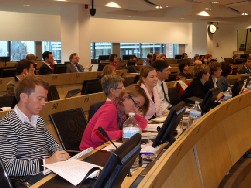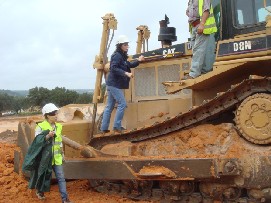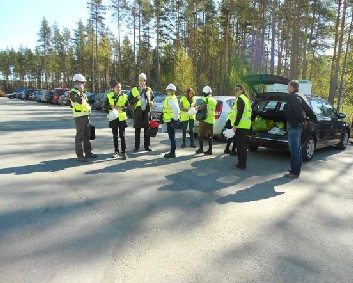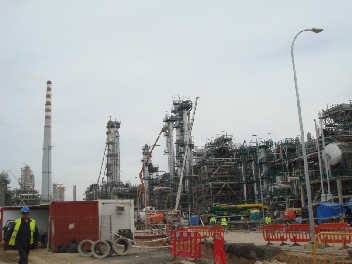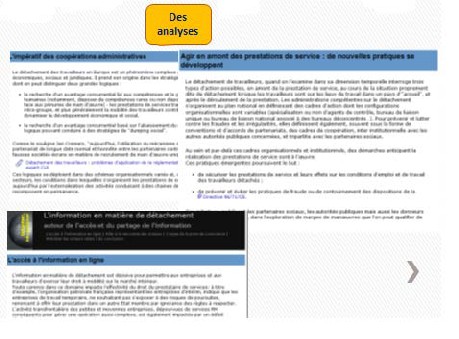 Project supported by the EUROPEAN COMMISSION DG Employment, social affairs and integration
Project supported by the EUROPEAN COMMISSION DG Employment, social affairs and integration


Improving collaborations between public authorities and social partners in Europe
History of the approach
December 2010 - December 2011. order to improve their ability to cooperate and take more effective action regarding the transnational secondment of workers, the labour departments of Belgium, Spain, France, Luxembourg, Poland and Portugal were involved in a joint programme for training their agents, which was coordinated by the INTEFP and ASTREES from December 2010 to December 2011.
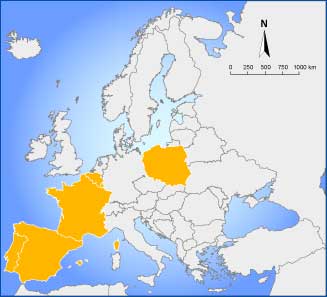 6 countries involved :
6 countries involved :
- BELGIUM
SPF Employment Labour and Social dialogue
- SPAIN
Labour and Social security Inspectorate
- FRANCE
General Directorate of Labour
- LUXEMBOURG
Inspectorate of Labour and Mines
- POLAND
National Labour Inspectorate
- PORTUGAL
Working Conditions Authority
This initiative led to the creation of a European network of 30 factory inspector "representatives", which put together a shared transnational resource centre on the secondment of workers: the EURODETACHEMENT website.
This project highlighted the fact that public authorities are unable to act alone when dealing with the complexity of the situations encountered.
The social partners also play a key role as they are the essential link between the businesses, employees and public authorities.
July 2012 - July 2013. As a result, a new project emerged, which was designed to make use of the momentum created by EURODETACHEMENT in order to develop this by focusing on the following two sectors that are particularly concerned by secondment: agriculture and construction.
The expansion was twofold: on the one hand, the 2012 project expanded the partnerships to include Denmark, Estonia, Finland, Lithuania and Romania and on the other hand, the European worker and employer union federations of the construction and agriculture sectors (FIEC, FETBB, EFFAT, GEOPA COPA) joined this new initiative, along with 19 employers and trade union organisations at the national level.
The final purpose of the project was to identify the complementary expertise and synergies in the roles undertaken by each party in order to consolidate the stakeholder networks and the impact of the initiatives that they lead.
Transnational workshops involving 98 operators within 3 geographical areas, which were identified according to the economic activities and flows of workers, were organised as well as a final seminar in June 2013 (150 people, representing 20 member states).
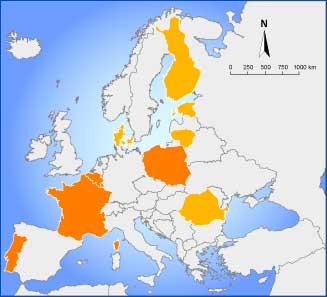 10 countries involved :
10 countries involved :
- BELGIUM
SPF Employment Labour and Social dialogue
- DENMARK
BAT Kartellet
- ESTONIA
Labour Inspectorate
- FINLAND
Ministry of Social Affairs and Health
- FRANCE
General Directorate of Labour
- LITHUANIA
Ministry of Social Security and Labour
- LUXEMBOURG
Inspectorate of Labour and Mines
- POLAND
National Labour Inspectorate
- PORTUGAL
Working Conditions Authority
- ROMANIA
National Labour Inspectorate
4 federations from the agriculture and construction sec
9 public authorities
19 national organisations :
EFBWW, EFFAT, FIEC, GEOPA COPA, national employers organisations, national trade union organisations
The summary of works this project is available on the EURODETACHEMENT website EURODETACHEMENT
Using the lessons learnt from this initiative, the organisations involved decided to pursue this enterprise at the project summary coordination committee, with the following two work objectives:
-increasing the capacity of the qualified inspection agents and the liaison officers to cooperate transnationally and thereby enhance the impact of initiatives conducted by the public authorities;
-pursue the development of synergies between the public authorities (factory inspections, authorities responsible for social welfare and the tax authorities) and the social partners.
February 2014 - February 2015 the launch of a new project coordinated by 14 labour administrations (Belgium, Spain, Estonia,
Finland, France, Italy, Ireland, Latvia, Luxembourg, The Netherlands, Poland, Portugal and Romania) as well as 5 European federations (agriculture, construction and temporary employment sectors: FIEC, FETBB, EFFAT, GEOPA COPA, EUROCIETT).
This joint training project for 56 factory inspectors from these 14 European countries included periods of full immersion and transnational workshops conducted throughout 2014 until January 2015.
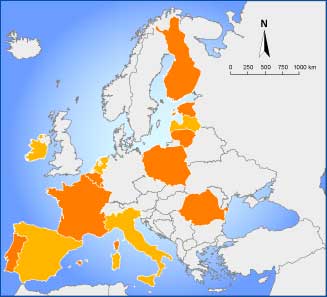 14 countries involved :
14 countries involved :
- BELGIUM
SPF Employment Labour and Social dialogue
- SPAIN
Labour and Social Security Inspectorate
- ESTONIA
Labour Inspectorate
- FINLAND
Regional State Agency of Southern Finland
- FRANCE
General Directorate of Labour
- IRELAND
National Employment Rights Authority
- ITALY
TELA
- LATVIA
State Labour Inspectorate
- LITHUANIA
Ministry of Social Security and Labour
- LUXEMBOURG
Inspectorate of Labour and Mines
- NETHERLANDS
Inspectorate SZW
- POLAND
National Labour Inspectorate
- PORTUGAL
Working Conditions Authority
- ROMANIA
National Labour Inspectorate
5 European federations :
EFBWW, EFFAT, FIEC, GEOPA COPA, EUROCIETT
The second stage of the project was then opened in 2015 on the collaborations between the stakeholders, including the social partners.
A two-day seminar on 27 and 28 January 2015 gathering together 167 participants from 25 member states (Austria, Germany, Belgium, Bulgaria, Croatia, Denmark, Spain, Estonia, Finland, France, Greece, Ireland, Italy, Latvia, Lithuania, Luxembourg, Malta, the Netherlands, Poland, Portugal, Czech Republic, United Kingdom, Romania and Sweden) made it possible to share experience on various types of initiative (information and awareness building, inspections and monitoring, prevention and anticipation of potentially problematic situations).
Who participates in these projects ? What does this produce ?
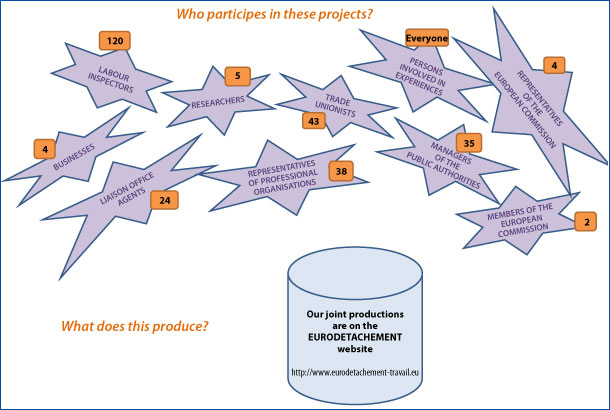
What are our activities and our work methods?
1- Joint training, periods of full immersion
between professionals working in a network (factory inspectors, liaison office agents) involving the following:
Periods of discussion to find out about the organisations, rationale behind initiatives, methods, legal instruments, practices of the public authorities and social partners of the various countries involved in the project.
Joint initiatives to share work methods.
Reports written by the participants in order to identify not only the difficulties encountered, but also the springboards for improving administrative cooperation and the exchange of information between public authorities and the other stakeholders of these operations.
As well as for identifying "best practices" in the three following areas: information and building awareness among the general public, the monitoring and inspection of workplaces and anticipation and prevention initiatives, particularly for major operations or recurring operations.
2- Transnational workshops, seminars for sharing information between the countries, from which the
seconded workers originate, and those that welcome them, for these professionals (factory inspectors,
liaison office agents) and for other players involved in experiments in the area of worker secondment (trade unionists, business representatives, professional organisations, other public authorities) in order to:
Using identified real situations
Pool the available knowledge regarding work situations, economic principles in the sectors concerned and the real living and working conditions of the seconded workers.
Sharing analyses regarding the obstacles, sticking points and difficulties encountered.
Building and developing drivers and instruments for taking action
Building on lessons learnt, formally documenting and circulating Experience, collaborative practices between the different stakeholders and the transnational collaborative practices.
Using a so-called 'bottom-up' work method, that is:
- - During the periods of immersion (1st to 3rd EURODETACHEMENT project)
- - Or thanks to a preliminary study, led by the project team (2nd project)
- - Or during transnational workshops and discussion seminars (the three projects)
The participants list of the cases, propose analyses, report on the problems and successes they have encountered, consider measures to drive change and formulate proposals.
In the coordination committee meetings of the different projects
Using the work done, the managers of the national public authorities and representatives of the European federations discuss the frameworks, resources, methods and tools which support and add structure to the initiatives in the field and the administrative cooperation.
- The national legal frameworks (legal resources of the inspection departments, transcription of the European directives applicable to secondments, formalities regarding transnational services and penal and administrative sanctions, etc.)
- The organisation modes (road and services of the liaison offices, professional network organisation, relations between the public authorities responsible for social welfare, tax authorities, social partners and other stakeholders, etc.)
- The quality of the exchanges of information between public authorities (improved management of exchanges of information, quality of the investigations carried out in advance and after these discussions, capacity to use the IMI system, transnational monitoring of the files, etc.)
- The development of initiatives promoting cooperation (bilateral and trilateral operational meetings, tool sharing, exchanges of civil servants, data sharing, feedback on actual cooperative work in order to understand the sticking points, creation of transnational initiatives, etc.)
Our partners:
2010-2011 project
- Federal Public Department for Employment, Works and Labour Negotiations
(Belgium)
- The General Office for Factory Inspections and Social Security (Spain)
- The Factory Inspection and Social Security School of Madrid (Spain)
- The General Works Office (France)
- The Factory and Mining Inspectorate (Luxembourg)
- National Factory Inspectorate (Poland)
- Training Institute of the National Factory Inspectorate of Wroclaw (Poland)
- Working Conditions Authority (Portugal)
Within the project team
- Company Europe Employment Works Association (France)
- Strasbourg University Institute of Works (France)
- European Institute for Construction Labour Research CLR (The Netherlands)
2012-2013 project
European partners:
- European Confederation of Trade Unions (support)
- European Construction Industry Federation - FIEC
- European Federation of Building and woodworkers EFBWW
- Employers' Group of Professional Agricultural Organisations in the European Union - GEOPA COPA
- European Federation of Food, Agriculture and Tourism EFFAT
National partners:
- Belgium
- Federal Public Department for Employment, Labour and Social Negotiation
- General Works Federation of Belgium FGTB
- Convention of Christian Trade Unions CSC
- Construction Confederation
- Denmark
- Estonia
- Tööinspektsioon Inspectorat du travail
- Finland
- Ministry Of Social Affairs and Health
- Rakennnusliitto
- Finnish Construction Trade Union
- Confederation of Finnish Construction Industries
- France
- General Labour Directorate
- General Confederation of Works CGT
- General Food Federation FGA CFDT
- French Construction Industry Federation FFB
- National Federation of Farming Trade Unions FNSEA
- Lithuania
- Ministry of Social Security and Labour
- Lithuanian Building Workers Trade Union
- Lithuanian Trade Union "Solidarumas"
- Lithuanian Builders Association
- Luxembourg
- Labour and Mining Inspectorate
- Federation of Christian Trade Unions of Luxembourg LCGB
- Federation of Artisans
- Poland
- National Labour Inspectorate
- Związek Zawodowy Budowlani
- Portugal
- Working Conditions Authority ACT
- Federação dos Sindicatos da Agricultura, Alimentação, Bebidas, Hotelaria e Turismo de Portugal FESAHT
- Confederação dos Agricultores de Portugal CAP
- Romania
- Ministry of Works, the Family and Social Welfare – Factory Inspectorate
- National Confederation of Agriculture, Food, Tobacco and Related Domains and Services AGROSTAR
Within the project team
- Company Europe Employment Works Association (France)
- Strasbourg University Institute of Works (France)
- European Institute for Construction Labour Research CLR (The Netherlands)
2014-2015 project
The national public authorities
- Belgium: Federal Public Department for Employment, Labour and Social Negotiation
- Spain: General Labour and Social Security Inspectorate
- Estonia: Labour Inspectorate
- Finland: Regional State Administrative Agency Southern Finland
- France: General Labour Directorate
- Ireland: National Employment Rights Authority
- Italy: Territorio Lavoro
- Latvia: National Factory Inspectorate
- Lithuania: Ministry for Social Security and Labour
- Luxembourg: Factory and Mining Inspectorate
- Netherlands: Inspectorate SZW
- Poland: National Factory Inspectorate
- Portugal: Working Conditions Authority
- Romania: Factory Inspection -
Within the project team
- Company Europe Employment Works Association (France)
- Strasbourg University Institute of Works (France)
- European Institute for Construction Labour Research CLR (The Netherlands)
European social partners
- European Construction Industry Federation – FIEC
- European Federation of Building and woodworkers –EFBWW
- Employers' Group of Professional Agricultural Organisations in the European Union - GEOPA COPA
- European Federation of Food, Agriculture and Tourism EFFAT
- European Confederation of Private Employment Agency EUROCIETT
2016-2018 project
National public authorities
- Belgique : Service public Fédéral Emploi, Travail et Concertation sociale
- Croatie : Ministry of Labour and Pension System
- Estonie : Inspectorat du travail
- Finland: Regional State Administrative Agency Southern Finland
- Regional State Administrative Agency South-western Finland
- France : Direction Générale du Travail
- Irlande : Workplace Relations Commission
- Lettonie: Inspection Nationale du Travail
- Pays Bas : Inspectorate SZW
- Pologne : Inspection Nationale du Travail
- Portugal : Autorité pour les Conditions de Travail
- Roumanie : Inspection du travail
- Suède : Swedish Work Environment Authority
Other partner :
- Allemagne : Arbeit & Leben
Within the project team
- Association Travail Emploi Europe Société ASTREES (France)
- European Institute for Construction Labour Research CLR (The Netherlands)
European social partners
- European Construction Industry Federation – FIEC
- European Federation of Building and woodworkers – EFBWW
- European Federation of Food, Agriculture and Tourism - EFFAT
- Word Employment Confederation Europe - WEC Europe
- European Trade Union Confederation - ETUC
2018-2020 project
National public authorities
- Belgique : Service public Fédéral Emploi, Travail et Concertation sociale
- Bulgaria: General Labour Inspectorate
- Croatie : Ministry of Labour and Pension System
- Estonia : Estonian Labour Inspectorate
- France : Direction Générale du Travail
- Irlande : Workplace Relations Commission
- Italy : National labour Inspectorate
- Latvia: State Labour Inspectorate
- Luxembourg : Inspection du travail et des mines
- Netherlands : Inspectorate SZW
- Norway : Norwegian Labour Inspection Authority
- Poland : National Labour Inspectorate
- Portugal : Autorité pour les Conditions de Travail ACT
- Romania : Labour Inspectorate
- Sweden : Swedish Work Environment Authority
Other partner :
- Allemagne : Arbeit & Leben (Hambourg et Berlin)
Within the project team
- Association Travail Emploi Europe Société ASTREES (France)
- Tilburg University (Netherlands)
European social partners
- European Construction Industry Federation – FIEC
- European Federation of Building and woodworkers – EFBWW
- European Federation of Food, Agriculture and Tourism - EFFAT
- Word Employment Confederation Europe - WEC Europe
- European Trade Union Confederation - ETUC
 Project supported by the EUROPEAN COMMISSION DG Employment, social affairs and integration
Project supported by the EUROPEAN COMMISSION DG Employment, social affairs and integration


 Project supported by the EUROPEAN COMMISSION DG Employment, social affairs and integration
Project supported by the EUROPEAN COMMISSION DG Employment, social affairs and integration


 6 countries involved :
6 countries involved : 10 countries involved :
10 countries involved : 14 countries involved :
14 countries involved :
